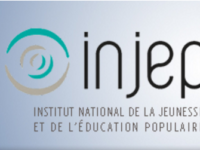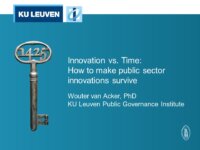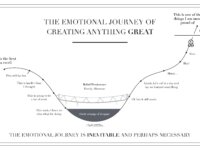Times are tough. Governments across the globe need to find ways to keep up with ever-faster changing times, move beyond the constraints of traditional approaches, and leverage innovation to improve public policies and services. One way many governments have sought to advance innovation was by establishing public sector innovation labs over the past 20 years or so. In our first post we outlined the main purposes and learnings of public innovation labs. In this post,...
Posts on Learning from Failure
Last week, the OPSI hosted a Rules as Code meet-up for government and inter-governmental organisation (IGO) officials. The meet-up was the first of several that the OPSI intends to host in support of a growing movement in public administration inspired by the promise of Rules as Code (RaC). We at OPSI believe in the promise of RaC as an emergent approach, something we explored in our RaC primer. We think that this is something which...
On 15 October 1987, renowned British meteorologist Michael Fish presented his usual television weather forecast, jovially remarking: “Earlier on today, apparently, a woman rang the BBC and said she heard there was a hurricane on the way. Well, if you’re watching, don’t worry, there isn’t!” He proceeded to give his analysis, which acknowledged the possibility of high winds but gave no major cause for alarm. That night, an extratropical cyclone with gusts exceeding…
“In medias res” is a narrative technique, used in a variety of works ranging from The Odyssey to Raging Bull, in which a story opens in the middle of the action. I am co-opting the term here to describe the kind of learning teams we need now to learn alongside covid-19 responses. The covid-19 crisis has now affected almost every aspect of everyone’s life globally. Nothing in recent history has provided such a unique opportunity...
OPSI met with the French Experimental Fund for Youth to discuss experimentation.
OPSI followed up on the French Ministry of Defence's Ideas Challenge.
Some things are so small that they can seem completely insignificant. A misplaced letter perhaps. Take, for instance, the letter L. But in the English language a missing ‘l’ can transform a word. Such as the word “public”. Why do I mention this? Because once upon a time in my public sector career, there was a report from the area that I was working in that was published, and where the letter ‘l’ was indeed...
This blog was guest written by Wouter van Acker, PhD, KU Leuven Public Governance Institute I should know better than to write a blog starting with a ‘how-to-title’. One conclusion after writing a PhD on public sector innovation, which is what I did and why I’m writing here, is that there is no such thing as a ten-tip-recipe-for-success in innovation. But we all succumb to the appeals of clickbait. So here we are. In 2014...
When public sector innovation is talked about it can often seem like a new focus, or something that governments have only recently paid attention to. Yet on a recent holiday I had a reminder that governments have been innovating for a long time, and that many of the issues that we face today when innovating are not new. In this case the reminder was a Swedish naval vessel built early in the 17th Century. The...
Have you ever felt bogged down or stuck when you were trying to introduce something new? When you just felt like it was easier to give up? At the start of an innovative project – whether it starts with a cool new idea, or with a problem that provides an opportunity to rethink how things are done – there can be a lot of energy and enthusiasm. The sense that things could be better, that...










